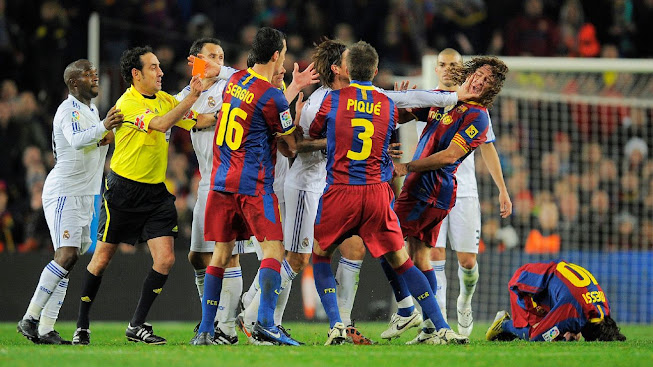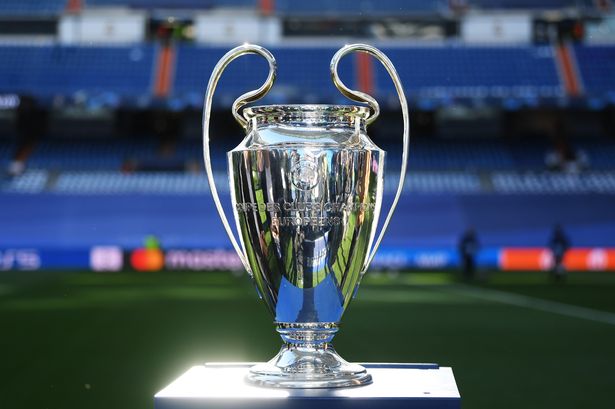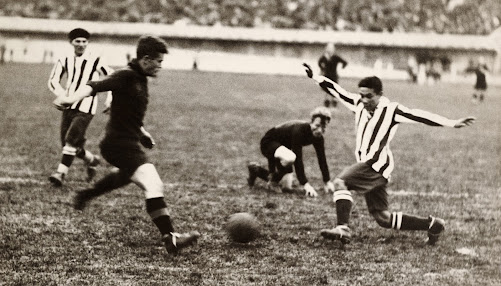El Clásico: A Historic Rivalry Steeped in Footballing Passion
Introduction:
Football is a sport that brings people together, igniting passions and fostering deep-rooted rivalries. One such rivalry that has captured the imagination of fans worldwide is "El Clásico." The clash between FC Barcelona and Real Madrid, two Spanish footballing giants, is a historic battle that transcends the boundaries of the sport. In this blog, we delve into the captivating history of El Clásico, exploring its origins, memorable moments, and the cultural impact it has had over the years.
Origins:
 |
| May 13, 1902 Copa del Rey Madrid emerged victorious with a 3-1 win |
The roots of El Clásico trace back to the early 20th century when Barcelona and Real Madrid were among the pioneering clubs of Spanish football. The first competitive match between the two teams took place on May 13, 1902, in the Copa de la Coronación, which later became the Copa del Rey. Madrid emerged victorious with a 3-1 win. Little did they know that this encounter would spark a rivalry that would last for decades to come.
Political and Cultural Undercurrents:
 |
| Real madrid defeated barcalona by 11-1 |
Beyond the realm of football, El Clásico has often reflected the political and cultural tensions between Catalonia, the region where Barcelona is located, and the Spanish capital of Madrid. During Francisco Franco's dictatorship, Real Madrid was seen as the favored club, symbolizing the centralizing Spanish state, while Barcelona represented Catalan identity and autonomy. This backdrop further intensified the rivalry and added a layer of significance beyond the pitch.
Memorable Moments:
 |
| Argentine forward Alfredo Di Stefano |
Over the years, El Clásico has been the stage for countless dramatic and unforgettable moments. One such instance is the "Di Stefano Transfer Controversy" in the 1950s when both clubs vied for the signature of Argentine forward Alfredo Di Stefano. After a prolonged dispute, he eventually joined Real Madrid, thus altering the trajectory of the rivalry. This incident set the tone for the fierce competition that would unfold in the coming decades.
The 1980s witnessed the rise of two iconic figures who would define El Clásico for a generation. Barcelona's Johan Cruyff and Real Madrid's Francisco Gento became synonymous with the clubs, leaving an indelible mark on the rivalry. Their battles on the pitch captivated fans around the world and added to the lore of El Clásico.
In recent times, the rivalry has been highlighted by the presence of two of the game's greatest players, Lionel Messi and Cristiano Ronaldo. Their individual brilliance, as well as their head-to-head battles in El Clásico, have brought a new level of excitement to the fixture, captivating global audiences and cementing their places in football history.
Beyond Football:
El Clásico has transcended the boundaries of sport and become a cultural phenomenon. The matchup has become a showcase of Spanish footballing excellence and has attracted fans from all corners of the globe. The passion displayed in the stands and the fierce devotion of supporters have transformed the fixture into an event that extends far beyond the ninety minutes on the field.
Conclusion:
El Clásico stands as a testament to the power of football to ignite passions, bridge divides, and capture the imagination of millions. With its rich history, iconic moments, and cultural significance, the clash between Barcelona and Real Madrid has solidified its place as one of the greatest rivalries in the world of sports. As fans eagerly await the next chapter of El Clásico, one thing is certain: the intensity, drama, and magic of this historic encounter will continue to enthral generations of football enthusiasts for years to come.




Comments
Post a Comment